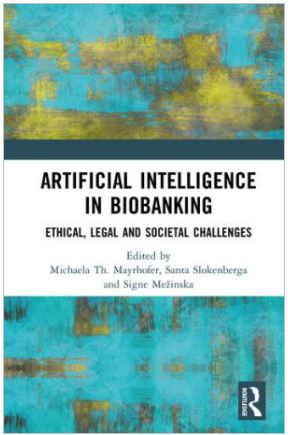Routledge
Artificial Intelligence in Biobanking: Ethical, Legal and Societal Challenges
Artificial Intelligence in Biobanking: Ethical, Legal and Societal Challenges
Couldn't load pickup availability
FREE SHIPPING
Edited by: Michaela Th. Mayrhofer, Santa Slokenberga, Signe Mežinska
This insightful collection highlights the ethical, legal and societal issues associated with the increasing role played by artificial intelligence (AI) in medical biobanks, a key research resource in the global study of disease prevention and the improving of individual care.
Although AI has the potential to speed up health research, the book considers the numerous questions that the technology poses, from the building of trust to the prevention harm to individuals, vulnerable groups or entire populations. Examining the tension between scientific progress and the safeguarding of individual rights, and covering key issues such as accountability, data bias, transparency and liability, the book considers the legal landscape in which biobanks operate, and what layers of governance are required to oversee such an important resource in a fluid technological age.
A timely volume that brings together scholars and experts from the social sciences, ethics and law, this important book will interest researchers and professionals in Biomedicine, Law, and the broader Health Sciences.
Contents:
Introduction Peaking in the Blackbox of AI and Its Many Layers.
- Michaela Th. Mayrhofer, Santa Slokenberga, Signe Mežinska
- Part 1: Legal Frameworks of AI
- 1. The Approach of EU Law to Tackling Statistical Bias in Medicine
- Katharina Ó Cathaoir
- 2. Liability for Damages, AI, and Machine Learning for Digital Pathology as New Challenges for Biobanks
- Dorota Krekora-Zając
- Part 2: Between Risk and Trust
- 3. Unique Design—the Need for Individualized Models of Trust in Biobanking AI
- Anna Clareborn
- 4. A Possible Risk Governance Approach for AI in Health Research and Biobanking
- Ilaria Colussi
- 5 Artificial Intelligence, Sex, and Gender: Hypes, Hopes, and Potential Risks in Biobanking
- Kaya Akyüz, Mónica Cano Abadía, Melanie Goisauf
- Part 3: Communicating the Unknown
- 6. Fairness of an AI System in the Case of a Biobank of Images and Imaging Biomarkers
- Valentina Colcelli
- 7. Artificial Intelligence and Communication with Research Participants in the Process of Biobanking Human Biological Material
- Jarosław Sak, Jakub Pawlikowski
- 8. Tackling AI Transparency Concerns in Biomedical Research: Bringing a Communication-Participatory Approach to the Conversation
- Leslie Salgado Arzuaga
- Part 4: Embracing the Potentiality
- 9. Social Acceptance of Artificial Intelligence in Biobanking
- Elodie Caboux, Patrick Courtney, Io Hong Cheong, Zisis Kozlakidis
- 10. Biobank-based Research Employing AI Techniques: Challenges for Research Ethics Committees
- Signe Mežinska
- 11. Powerful AI: Between Accountability and Potentiality
- Michaela Th. Mayrhofer
- Conclusion
- 12. Learnings from Unboxing the Blackbox
- Michaela Th. Mayrhofer, Santa Slokenberga, Signe Mežinska
Editors:
Biography
Michaela Th. Mayrhofer is a political scientist, historian, and sociologist specializing in the governance of life sciences. She is founder of Papillon Pathways e.U. and the lead of ELSI at the Medical University of Innsbruck, Institute of Human Genetics, both Austria. Michaela has served as Head of ELSI Services & Research Department (2019–2025) and Co-Interim Director General (2020) at BBMRI-ERIC, Austria. She is a review editor for Frontiers in Digital Health, as well as an independent ethics advisor to several consortia and organizations, and a research ethics expert for the European Commission.
Santa Slokenberga is an associate professor in medical law and a senior lecturer in administrative law at the Faculty of Law, Uppsala University, Sweden. She is a board member of the Nordic Permed Law Network and the European Association of Heath Law, as well as an independent ethics advisor to several consortia and organizations.
Signe Mežinska is a bioethicist and sociologist specializing in biomedical research ethics and medical ethics. She leads a research group at the University of Latvia, focusing on ethical challenges in the development and application of biotechnologies and the protection of patients' and research participants' rights. Signe has served as an ethics expert for international organizations, including UNESCO's International Bioethics Committee, WHO, and the European Commission.
Related Subjects
Bioinformatics; Health Law and Ethics; Medical & Healthcare Law; Medical Ethics; Bioscience; Public Health Policy and Practice; Health and Social Care; Law; Medicine; Medicine, Dentistry, Nursing & Allied Health
Why Buy This Book?
This book provides a comprehensive analysis of how AI impacts biobanking, tackling questions of trust, accountability, data bias, transparency, and liability. Edited by top European experts in law, bioethics, and governance, it offers both theoretical insights and practical guidance, making it an essential reference for professionals working at the intersection of law, medicine, and emerging technologies.
Keywords:
AI in biobanking, legal challenges, ethical issues, societal challenges, health law, medical ethics, bioethics, liability, data governance, Routledge
Target Audience:
Lawyers, policymakers, bioethicists, researchers, medical professionals, legal scholars, data governance experts, healthcare regulators, PhD students, universities
Genre:
Law, Bioethics, Artificial Intelligence, Medical Law, Health Policy
📘 Learn more about shipping, delivery times, and returns, see our FAQ here


